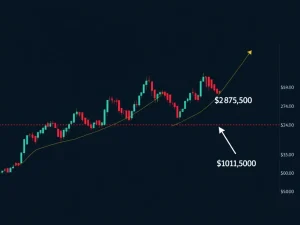Nomura’s Bold Leap: Capturing Japan’s Booming Institutional Crypto Market

The cryptocurrency world is witnessing a significant shift, particularly in Asia. Financial giants are now making decisive moves into digital assets. One of the most impactful developments comes from Nomura Holdings, a leading global financial services group. Their Switzerland-based subsidiary, Laser Digital Holdings, is actively pursuing a crypto trading license in Japan. This strategic initiative aims to tap into the rapidly expanding Japan institutional crypto market, signaling a major endorsement of digital assets by traditional finance.
Nomura’s Strategic Entry into the Japanese Crypto Market
Nomura Holdings, a powerhouse in Japan’s financial sector, is making a pivotal move. Its subsidiary, Laser Digital, confirmed its intentions to engage with Japan’s Financial Services Agency (FSA). The goal is clear: secure a crypto trading license. This action underscores a growing confidence among established financial institutions in the long-term viability of cryptocurrencies. For institutional investors in Japan, this development offers new avenues for engaging with digital assets through a trusted, regulated entity.
Laser Digital’s spokesperson confirmed ongoing pre-consultation talks with the FSA. The exact application date remains ‘undetermined,’ contingent on the outcome of these discussions. If approved, Laser Digital plans to launch comprehensive broker-dealer services. These services would cater to both traditional financial firms and crypto-focused companies, including various exchanges across Japan. This positions Nomura to become a key player in the country’s evolving digital asset landscape.
Why Nomura Targets the Japan Institutional Crypto Market
Nomura’s push into the Nomura crypto market in Japan is not an isolated event. It reflects a broader trend of increasing institutional interest in the region. Recent surveys highlight this growing appetite. For example, a survey conducted by Nomura and Laser Digital in June revealed compelling statistics. It showed that 54% of investment managers — including family offices, corporations, and other institutional investors — anticipate investing in cryptocurrencies within the next three years. This strong demand acts as a powerful catalyst for firms like Nomura.
Furthermore, other major Japanese financial players are also making their moves. Daiwa Securities Group, another prominent brokerage in Japan, recently introduced a crypto lending service. This service allows clients to borrow Japanese yen using Bitcoin (BTC) and Ether (ETH) as collateral. Such initiatives from industry leaders like Nomura and Daiwa indicate a collective response to market demand. They are building the infrastructure necessary for sophisticated investors to access digital assets securely and compliantly.
Laser Digital Japan: A New Era for Institutional Investors
The potential entry of Laser Digital Japan into the market marks a new era. Institutional investors typically require robust regulatory frameworks, high levels of security, and established financial infrastructure. Laser Digital, backed by Nomura, is well-positioned to meet these stringent requirements. Its focus on broker-dealer services for institutional clients means it will provide essential liquidity and regulated access points for large-scale investments.
This development is crucial for several reasons:
- Enhanced Trust: Nomura’s reputation lends significant credibility to the crypto space, potentially attracting more conservative institutional capital.
- Regulated Access: An FSA license ensures operations adhere to strict financial regulations, offering protection and clarity for investors.
- Market Liquidity: Broker-dealer services facilitate smoother and more efficient trading for large volumes, improving overall market health.
- Diversification Opportunities: Institutions gain a new avenue to diversify portfolios with digital assets, mitigating risks associated with traditional investments.
The establishment of such services by a major financial group like Nomura through Laser Digital could significantly accelerate the mainstream adoption of cryptocurrencies among institutional players in Japan.
Japan’s Progressive Stance on Crypto Regulation
The timing of Nomura’s move aligns perfectly with Japan’s increasingly favorable regulatory environment. Japanese crypto regulation has undergone significant reforms. The country aims to align crypto sector rules with its traditional securities market. This proactive approach fosters innovation while ensuring investor protection. Japan has long been a pioneer in crypto regulation, being one of the first countries to regulate exchanges following the Mt. Gox incident.
Recent policy shifts further demonstrate this progressive stance:
- Tax Reforms: Plans to lower taxes on crypto assets make investments more attractive for both individuals and institutions.
- Stablecoin Approvals: In August, regulators quietly greenlit Japan’s first stablecoin pegged to the Japanese yen. This move provides a stable, regulated on-ramp and off-ramp for crypto transactions.
- Alignment with Traditional Finance: Efforts to integrate crypto rules with existing financial laws provide clarity and reduce regulatory uncertainty.
These policy changes create a supportive ecosystem. They encourage financial institutions to explore and enter the digital asset market with greater confidence. This regulatory clarity is a key differentiator for Japan, setting it apart from some other nations still grappling with crypto policy.
The Role of the FSA Crypto License in Market Expansion
The pursuit of an FSA crypto license by Laser Digital is a critical step. The Financial Services Agency (FSA) is Japan’s integrated financial regulator. Its approval signifies a high standard of operational integrity and compliance. For institutional investors, operating within a regulated framework is paramount. It provides legal certainty and mitigates many of the risks associated with unregulated markets.
An FSA license would enable Laser Digital to:
- Operate legally and transparently within Japan.
- Offer a wider range of crypto products and services.
- Build trust with institutional clients who demand regulatory compliance.
- Contribute to the overall stability and maturity of the Japanese crypto market.
The rigorous application process ensures that only well-capitalized and compliant entities can offer crypto services. This safeguards investors and strengthens Japan’s position as a leading, regulated crypto hub. The FSA’s careful oversight fosters a secure environment for digital asset innovation and investment.
Booming Crypto Adoption and Market Growth in Japan
Alongside favorable regulations and institutional interest, crypto adoption in Japan has seen remarkable growth. A Chainalysis report from September 2024 highlighted this trend. Among the five markets in the Asia Pacific (APAC) region, Japan experienced the strongest growth. The country’s value received on-chain surged by 120% year-on-year in the 12 months leading to June. This dramatic increase underscores a vibrant and expanding market.
Chengyi Ong, Chainalysis’s head of APAC policy, noted that Japanese crypto market activity mirrors global trends. A significant factor was the ‘sharp pickup in trading volume’ following the US presidential election. This suggests that macroeconomic and geopolitical events can also influence market dynamics in Japan. The confluence of institutional backing, regulatory support, and increasing public adoption positions Japan as a critical player in the global crypto economy.
Companies like Metaplanet are also expanding their Bitcoin strategies with new units in the US and Japan. This further validates the growing confidence in Japan’s crypto ecosystem. As more traditional firms and crypto-native businesses focus on Japan, the market is poised for continued robust expansion.
Future Outlook: Japan as a Global Crypto Leader
Nomura’s strategic move, coupled with Japan’s progressive regulatory stance and booming adoption, paints a clear picture. Japan is rapidly solidifying its position as a global leader in the institutional crypto space. The commitment of major financial players like Nomura and Daiwa, alongside a forward-thinking regulatory body like the FSA, creates a powerful synergy. This synergy fosters innovation, ensures investor protection, and facilitates market growth.
The increasing integration of digital assets into traditional financial frameworks in Japan will likely serve as a model for other nations. As more institutions seek to enter this dynamic market, the demand for regulated, reliable services will only intensify. Japan’s proactive approach is not just attracting domestic investment; it is also positioning the country as an attractive destination for international crypto businesses and capital. The future of finance in Japan looks increasingly digital, with Nomura leading the charge in capturing its vast potential.









